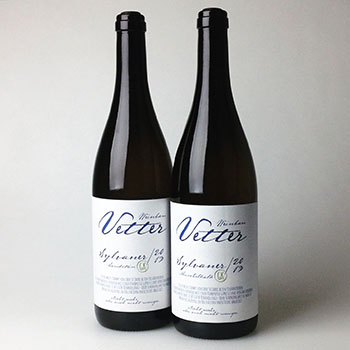Sylvaner through the Looking Glass
2013 Stefan Vetter:
Sylvaner GK Sandstein &
Sylvaner GK Muschelkalk
As a starting place, ignore the varietal "Sylvaner" and any associations you may have – these wines are looking glasses into the soil.
Think De Moor or Dauvissat Chablis, combined with the salinity of Ganevat's wines.
We know it’s easy to drop rock star names and bask in the associations, but in this case, it feels like the only way to convey the seriousness of Vetter’s wines. The textural quality of the minerality and acidity is eerily similar to De Moor and Dauvissat, especially in the limestone bottling. The nutty, saline quality of the wines and their sheer force, recalls something of Ganevat.
Today, we are excited to offer a miniscule parcel of Vetter’s two "GK" wines. These are Vetter’s top, single-vineyard expressions – in this case the "GK" stands for the village and vineyard (Gambacher Kalbenstein) and does not denote "Gold Kapsule" or any level of sweetness.
 |
These are bone-dry wines, reverberating with tension. One bottle is from sandstone, one from limestone. Taste for yourself – there is no mistaking the two.
The "Sandstein" GK is a veritable explosion of flower and fine mineral; it flaunts incredible herbal detail, all accented and lifted by a bright, glowing citrus.
The "Muschelkalk" (limestone) GK speaks more directly to the force and depth and texture of Chablis, with a mineral core that is penetrating and woven with saturating acidity. Of the two, it is the tenser wine – though both scream for a decant at this young age.
Stefan Vetter believes Sylvaner is a grape of extreme sensitivity and real nobility. He also believes that the clarity and finesse that the grape can achieve does not come easily. Thus Stefan farms just a few hectares of old-vine Sylvaner on steep, terraced sites.
In the vineyard, everything is done by hand following organic and biodynamic principles. Vetter picks earlier, looking for acidity and freshness. The grapes are gently pressed with a screw or basket press and are put directly into older barrels (Stockinger is the preferred barrel). There, they are left to ferment on their own and are normally bottled, unfiltered, after six months or much longer in barrel. That’s it. This is winemaking minimalism at its most fundamental.
The results are singular and undeniable. While Franken is a famous region, deep in history and lore, it has too often not lived up to the promise of the vineyards. Commercial farming, high yields, quick fermentations and harsh filtering have stripped some of its greatest wines of their essential character. Stefan Vetter’s profound Sylvaners offer a glimpse into the promise of the region.
To order, email offers@crushwineco.com or call the store at (212) 980-9463.
Joe Salamone
Wine Buyer
Crush Wine & Spirits
2013 Vetter Sylvaner GK Muschelkalk & Sandstein
